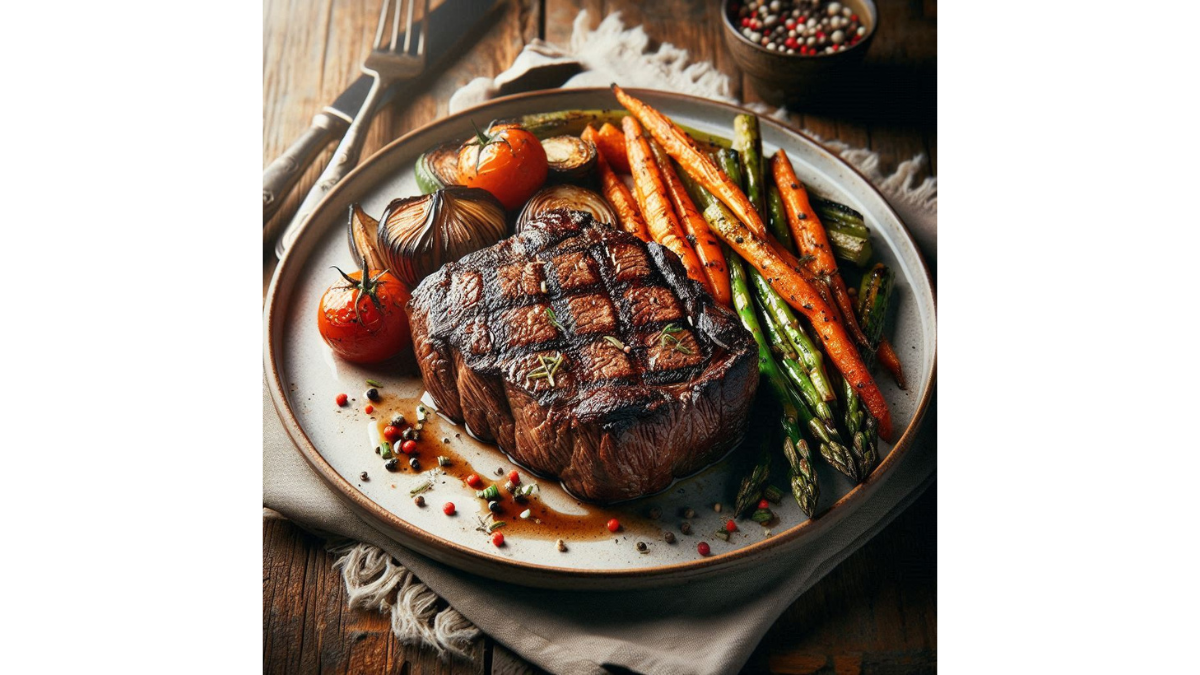Discover the Benefits of a Well-Planned Carnivore Diet

Discover the Benefits of a Well-Planned Carnivore Diet – The carnivore diet is a dietary regimen that focuses solely on meat and animal products while completely excluding plant-based foods. Yes, you read that right—only meat! This diet consists primarily of:
- Beef
- Pork
- Poultry
- Fish
- Eggs
- Animal-based fats such as butter and lard
The core principle behind the carnivore diet is the belief that human beings thrive on a diet that mimics our ancestral eating patterns. Many proponents argue that humans have evolved to digest animal proteins and fats better than carbohydrates from plants. Imagine visiting a steakhouse and having the option to feast on a variety of delectable meats without worrying about vegetables or grains. The simplicity is appealing to some—you get to enjoy hearty, satisfying meals while adhering to a strict food regimen. But, is it too good to be true?
History of Carnivore Diet
Historically, the carnivore diet is not a recent phenomenon. It harkens back to ancient hunter-gatherer societies that consumed primarily meat, often due to the scarcity of plant foods in their environments. The Inuit people, for example, thrived on a diet rich in fish, seals, and whale meat in the Arctic, which is an embodiment of the carnivore lifestyle. In more contemporary times, the concept gained traction in the early 2000s, popularized by various authors and health advocates, including Dr. Shawn Baker. He argues that our ancestors thrived on animal products, and many individuals have experienced significant health improvements, such as weight loss and better mental clarity, by adopting this diet. Many of us may have grown up hearing “Eat your vegetables!” as a universal piece of advice for good health. However, the carnivore diet challenges those norms, leading to rising debates and discussions around its potential benefits and risks.
In a world filled with dietary options—veganism, paleo, keto—the carnivore diet stands out as one of the most radical, eliciting both intrigue and controversy. As more people look to discover the benefits of a well-planned carnivore diet, it’s essential to dive deeper into its nutritional and health implications, as well as understand the scientific studies surrounding it.
Nutritional Benefits of a Carnivore Diet
High Protein and Fat Content
One of the most appealing aspects of the carnivore diet is its remarkably high protein and fat content. For many, this means they can enjoy hearty cuts of meat, rich in flavor while fueling their bodies with essential macronutrients. You might be curious about why protein and fat are so crucial. Here are some highlights:
- Muscle Repair: Protein helps repair and build muscle tissues. If you’ve ever hit the gym hard, you may have sworn by the benefits of high-protein meals for recovery.
- Satiety: Both protein and fat take longer to digest, which can help you feel fuller for longer periods. This means fewer cravings and easier adherence to your dietary choices.
- Energy Source: With minimal carbohydrates, the body shifts into a state of ketosis, where fat becomes the primary energy source, leading to stable energy levels throughout the day.
Picture starting your day with just a plate of bacon and eggs—goodbye mid-morning snacks! Such a simple yet fulfilling meal can kickstart your energy levels without the typical blood sugar crashes associated with carb-heavy breakfasts.
Nutrient Density
When you choose to follow a carnivore diet, you’re opting for foods that pack a serious nutritional punch. Despite the restrictive nature of this diet, animal products are incredibly nutrient-dense, meaning they provide a high number of essential vitamins and minerals per calorie. Let’s break it down:
- Vitamins and Minerals: Animal products are rich in essential nutrients like Vitamin B12, iron, and zinc—all vital for optimal bodily functions.
- Omega-3 Fatty Acids: By including fatty fish in your diet, you can enjoy the heart-health benefits associated with omega-3s, which support cardiovascular health and reduce inflammation.
- Creatine: Found primarily in meat, creatine supports brain health and increases muscle energy, making it a favorite among athletes.
In my own experience, I noticed that while following the carnivore diet, my energy levels felt elevated, and those afternoon slumps became a thing of the past. This increased vitality can often be attributed to nutrient density, ensuring that every bite contributes to your overall wellness. As you discover the benefits of a well-planned carnivore diet, the high protein and fat content, combined with the impressive nutrient density, can be powerful influencers on your health journey. But what about the potential health benefits this diet might offer? Let’s explore that next.
Health Benefits of a Carnivore Diet
Weight Loss
One of the major reasons people gravitate toward the carnivore diet is its potential for weight loss. With a focus on high-protein and high-fat animal products, there are a few key mechanisms that can facilitate shedding those extra pounds.
- Reduced Carb Intake: By eliminating carbohydrates, the body enters a state of ketosis, where it begins to burn fat for fuel instead of relying on sugars. This can lead to more rapid weight loss, particularly in the initial stages of adopting the diet.
- Increased Satiety: Those hearty cuts of meat are not only delicious; they’re also filling! Higher protein intake means you’re less likely to indulge in mindless snacking, leading to a natural caloric deficit.
- Simplicity and Adherence: With fewer food choices, meal planning can become less stressful. Personally, I found that the simplicity of deciding between steak or chicken made sticking to my diet much easier.
Many people have shared success stories of achieving their weight loss goals through the carnivore diet, praising the quick results accompanied by minimal hunger pangs.
Improved Mental Clarity
Another notable advantage of the carnivore diet is its impact on cognitive function. Diets rich in fats and proteins can lead to improved mental clarity, and here’s why:
- Stable Energy Levels: The switch to fat as a primary energy source provides a steady stream of fuel for your brain. Unlike the highs and lows associated with sugar consumption, many experience a more balanced energy release through animal-based fats.
- Brain-Boosting Nutrients: Animal products are rich in vital nutrients like omega-3 fatty acids and B vitamins, both of which are essential for maintaining optimal brain health. For example, one study highlights that omega-3s can improve cognitive functions such as memory and mood.
I remember transitioning to a carnivore diet and experiencing an unexpected surge in concentration during long hours at work. Tasks that previously felt overwhelming suddenly seemed manageable, thanks to the mental sharpness that many followers of this diet report. As you explore the health benefits of a well-planned carnivore diet, both weight loss and improved mental clarity stand out as compelling reasons to consider it. But while these benefits are enticing, it’s crucial to weigh them against potential risks. Let’s dive deeper into that next.
Potential Risks of a Carnivore Diet
Nutrient Deficiencies
While the carnivore diet may entice many with its promise of weight loss and increased mental clarity, it’s essential to acknowledge the potential risks that come with such a restrictive eating plan. One of the main concerns is nutrient deficiencies. By cutting out plant-based foods entirely, you might miss out on a range of vital nutrients. Here are a few to consider:
- Vitamin C: Generally associated with fruits and vegetables, Vitamin C is crucial for immune function and skin health. While some proponents argue that animal meat provides sufficient Vitamin C, others believe that a wholly carnivorous diet may fall short.
- Magnesium: Often found in leafy greens, nuts, and whole grains, magnesium supports numerous bodily functions, including muscle and nerve function. A lack of this mineral can lead to fatigue, muscle cramps, and even mood disturbances.
- Folate: This B vitamin, essential for cell division and the production of DNA, is abundant in legumes and dark green vegetables. Insufficient folate can result in various health issues, including anemia.
When I began my journey on the carnivore diet, I was initially overwhelmed by the rich protein and fat offerings. However, I quickly learned the importance of regularly monitoring my nutritional intake to avoid deficiencies. Consulting a healthcare professional can be invaluable in this context.
Lack of Fiber Intake
Another significant risk is the lack of fiber. Fiber is primarily found in plant-based foods and is vital for digestive health. Here are some key roles fiber plays in your body:
- Digestive Health: Fiber maintains healthy bowel movements and prevents constipation by adding bulk to your stool.
- Gut Health: Fiber acts as a prebiotic, nurturing beneficial gut bacteria and contributing to a balanced microbiome.
Imagine for a moment what happens when you don’t get enough fiber. Stomach discomfort, bloating, or irregularity can easily become your unwelcome companions. Many people, including myself, have felt these effects when transitioning to the carnivore diet, initially excited about the meat but quickly realizing that digestive health needs attention. So, while the carnivore diet may offer enticing benefits, it’s crucial to consider the associated risks thoughtfully. Ensuring nutritional balance should be a priority in any diet. As we move forward, let’s explore scientific studies that shed light on the impact of the carnivore diet on your overall health.
Scientific Studies on Carnivore Diet
Impact on Blood Markers
As you delve into the carnivore diet, it’s essential to consider scientific studies that help illuminate its effects on your health. One area that has garnered attention is the impact on blood markers—essential indicators of overall health. Research shows that a carnivore diet can significantly influence various blood markers. Here’s what the studies have revealed:
- Cholesterol Levels: Many early adopters reported elevated cholesterol levels, particularly LDL (low-density lipoprotein), often labeled as “bad” cholesterol. However, some studies indicate that, in certain individuals, this may not correlate with an increased risk of heart disease.
- Triglycerides: Interestingly, participants often experience a decrease in triglyceride levels when on a carnivore diet. Lower triglycerides can indicate improved heart health and enhanced fat metabolism.
- Inflammatory Markers: Emerging research suggests that some individuals may experience a reduction in inflammatory markers like C-reactive protein (CRP), which is linked to various chronic illnesses.
I remember a friend who adopted the carnivore diet and later shared his stunning lab results. To his surprise, despite some fluctuations in cholesterol, his triglycerides had significantly improved, and he felt more energized. However, it’s crucial to approach these findings with caution, as individual responses can vary greatly.
Effects on Gut Health
The effects of the carnivore diet on gut health have been a topic of considerable debate. While you might think that eliminating fiber could harm gut microbiome diversity, some studies suggest the outcomes may not be as straightforward. Here’s what research indicates about gut health on a carnivore diet:
- Microbiome Changes: Due to the absence of plant-based foods, the diversity of the gut microbiome may decrease. This could affect digestion and overall gut health. However, some individuals report better digestion, likely due to the elimination of problematic foods.
- Gut Permeability: Some proponents argue that a high-fat and low-carb diet can reduce gut permeability, thereby decreasing the likelihood of “leaky gut.” Research is still evolving in this area, but initial findings show intriguing possibilities.
When I first considered adopting this diet, I was anxious about how it would affect my gut health. After several months of careful adjustments, I noticed improved digestion, but I remained vigilant about listening to my body’s signals. While there is growing interest in understanding the scientific aspects of a carnivore diet, the evidence is still in its infancy. As you navigate this diet, it’s essential to weigh the findings against personal health experiences and consult healthcare professionals for tailored advice. Now, let’s address how to transition into a carnivore diet smoothly.
Transitioning to a Carnivore Diet
Elimination Phase
Transitioning to a carnivore diet can often feel like embarking on a culinary adventure. The first step in this journey is the elimination phase, where you remove all plant-based foods from your diet. This phase can sometimes be challenging but is crucial for your body to adapt effectively. Here’s how to make this transition smoother:
- Start Gradually: Instead of cutting out everything at once, consider easing into the diet. Begin by eliminating processed foods, sugars, and grains, then gradually remove fruits and vegetables over the course of a few days.
- Listen to Your Body: Pay attention to how your body reacts during this phase. Some might experience headaches or fatigue, commonly referred to as “keto flu,” as their bodies adjust. Staying hydrated and getting enough electrolytes can help mitigate these symptoms.
- Keep It Simple: Focus on consuming whole animal products such as beef, chicken, pork, fish, and eggs. This streamlined approach can help you stick to the diet while making meal decisions more manageable.
During my own transition, I found that preparing simple meals kept me from feeling overwhelmed. A basic grilled steak or roasted chicken became my go-to meals, allowing me to focus on adjusting without the need for elaborate recipes.
Building a Balanced Meal Plan
Once you’ve successfully navigated the elimination phase, the next step is building a balanced meal plan that focuses on nutrient-dense animal products. A well-structured plan can help ensure you meet your nutritional needs while enjoying the benefits of the carnivore diet. To create a balanced meal plan, consider the following:
- Variety of Protein Sources: Incorporate different types of meat, such as beef, lamb, pork, and poultry, to obtain various nutrients and keep your meals interesting.
- Include Healthy Fats: Don’t shy away from fats! Incorporate items like butter, ghee, or fatty cuts of meat, which are essential for energy and nutrient absorption.
- Track Your Intake: Initially, it can be helpful to keep a food diary or use an app to monitor your intake—this way, you can ensure you’re consuming a balance of proteins and fats while remaining alert to any potential deficiencies.
In my experience, planning meals ahead helped minimize decision fatigue and ensure I was getting enough variety. I started experimenting with diverse cuts of meat and different cooking methods, which added excitement to my meals. As you transition to a carnivore diet, focusing on the elimination phase and building a balanced meal plan will set the stage for a successful and enjoyable journey. While adapting your eating habits, it’s essential to address common misconceptions that may arise. Let’s explore that next.
Common Misconceptions about Carnivore Diet
Sustainability Concerns
As more people discover the benefits of the carnivore diet, several misconceptions arise, particularly regarding sustainability. Critics often question the environmental impact of a meat-heavy diet, which can leave many feeling conflicted. Here are some points to consider:
- Comparative Resource Use: It’s essential to weigh the resource use of livestock against other agricultural practices. While meat production does require significant land and water, some argue that certain rotational grazing methods can restore soil health and carbon sequestration.
- Local Farming Practices: Supporting local farms that practice sustainable animal husbandry can contribute positively to the environment while minimizing carbon footprints. By choosing grass-fed, pasture-raised options, you not only enjoy healthier meat but also support more sustainable practices.
- Plant-Based Contributions: Interestingly, conventional agriculture for plant-based diets isn’t without its downsides. Studies show that intensive agricultural practices can lead to deforestation and depletion of water resources, which may not always present a clearer alternative.
When I embarked on the carnivore diet, I initially wrestled with these sustainability concerns. However, I found comfort in turning to local farmers who prioritize ethical and sustainable practices, realizing that mindful sourcing makes a difference.
Impact on Cholesterol Levels
Another common misconception surrounding the carnivore diet is its effect on cholesterol levels. Many people fear that consuming large amounts of saturated fat and cholesterol-rich foods will lead to heart disease. However, the science may not be as clear-cut as it seems. Here’s what some studies and anecdotal evidence suggest:
- Individual Variability: Not everyone reacts to dietary cholesterol the same way. Some individuals can consume high amounts of cholesterol without experiencing significant changes to their blood levels.
- The Role of HDL: Higher intakes of healthy fats can raise levels of HDL (high-density lipoprotein), often referred to as “good” cholesterol. Elevated HDL is associated with a lower risk of heart disease.
- Focus on Inflammation: Recent research indicates that markers of inflammation, rather than cholesterol levels alone, play a more significant role in cardiovascular health. For many on the carnivore diet, the decreased inflammation associated with high-fat consumption can outweigh concerns about cholesterol.
In my personal journey, monitoring my own cholesterol levels helped illuminate these nuances. Even with a high-fat intake, my ratios improved, providing me with reassurance when it came to cardiovascular health. Navigating through common misconceptions like sustainability concerns and cholesterol impact can empower you in your carnivore journey. By arming yourself with accurate information, you can make well-informed decisions as you continue your exploration of this unique dietary approach. Next, let’s take a look at how athletes might also benefit from the carnivore diet.
Athletes and the Carnivore Diet
Performance Benefits
As athletes continuously seek ways to optimize their performance, the carnivore diet has piqued the interest of many in the sports community. The potential benefits of this protein-rich regimen can provide a compelling argument for those committed to performance enhancement. Here are some of the primary benefits athletes may experience on a carnivore diet:
- Enhanced Recovery: With a high intake of amino acids from protein sources, athletes may experience improved recovery times after strenuous workouts. Amino acids are the building blocks of muscle tissue, and adequate protein intake can help repair damage from intense training.
- Stable Energy Levels: The fat adaptation that comes from a carnivore diet can lead to more consistent energy levels throughout the day. Instead of the spikes and crashes associated with carb-heavy diets, many athletes report enduring energy, enabling longer and more effective training sessions.
- Reduced Inflammation: Certain studies suggest that a diet low in carbohydrates and high in healthy fats may reduce inflammation in the body. This reduction can lead to fewer injuries and faster recovery times, a boon for athletes pushing their limits.
A personal friend of mine who is an endurance runner adopted the carnivore diet before a major event. He found that not only did he recover faster post-race, but he also reported feeling more energized during his training sessions, providing compelling anecdotal evidence to the diet’s potential benefits.
Challenges and Considerations
While the carnivore diet offers promising performance benefits, it also presents challenges and considerations for athletes to keep in mind:
- Initial Adjustment Period: Transitioning to a carnivore diet may come with an adjustment phase, often accompanied by fatigue and mental fog. For athletes, this period can be particularly challenging as their bodies adapt to burning fat for fuel.
- Nutritional Balance: While protein and fats are abundant, athletes must ensure they are still meeting their micronutrient needs. Monitoring nutrient intake is crucial to avoid deficiencies that could hinder performance or recovery.
- Limited Food Choices: The restrictive nature of the carnivore diet can make it tough for athletes to get variety in their meals, potentially leading to boredom or lack of motivation. Exploring different cooking methods and cuts of meat is vital for maintaining enthusiasm.
When I spoke with my friend about his experience on the carnivore diet, he acknowledged encountering some of these challenges initially. He emphasized the importance of staying motivated and adjusting his meal prep to keep things exciting, which ultimately contributed to his success. As athletes consider the carnivore diet, weighing the performance benefits against potential challenges will be key in making an informed decision. With the right strategies in place, many athletes find they can harness the advantages of this unconventional approach to dieting. Next, let’s explore some delicious recipes and meal ideas to fuel your carnivore journey!
Recipes and Meal Ideas for a Carnivore Diet
Protein-Rich Meal Recipes
When embarking on a carnivore diet, having a stash of protein-rich meal recipes can make it easier to stay committed to your new eating plan. Here are some satisfying meal ideas that are not only delicious but also packed with nutrition:
- Grilled Ribeye Steak: A classic choice! Simply season a thick-cut ribeye steak with salt and pepper, then grill it to your desired doneness. Serve with a side of butter melted on top for added richness. Cooking Time: 10-15 minutes Protein: ~60g per steak
- Baked Salmon: Drizzle salmon fillets with olive oil and season with salt. Bake at 375°F (190°C) for 15-20 minutes until flaky. This meal is perfect for its omega-3 content! Cooking Time: 20 minutes Protein: ~39g per fillet
- Egg and Bacon Scramble: For breakfast or any time of day, scramble 3-4 eggs with crispy bacon. Add some cheese if you like! It’s a hearty and fulfilling meal. Cooking Time: 10 minutes Protein: ~30g for 3 eggs and 3 strips of bacon
These meal ideas not only satisfy hunger but also keep your protein intake high, providing the nutrients you need to thrive on a carnivore diet.
On-the-go Snack Ideas
One of the challenges of any diet can be finding easy, convenient snacks—especially on a carnivore diet. Here are some tasty on-the-go snack ideas that require minimal prep and are packed with protein:
- Beef Jerky: A classic, portable option! Look for jerky that doesn’t contain added sugars or preservatives for the best health benefits. Protein: ~10g per ounce
- Hard-Boiled Eggs: Prepare a batch at the beginning of the week for easy snacking. They’re filling, nutritious, and perfect for a quick protein boost. Protein: ~6g per egg
- Pork Rinds: Crunchy and full of flavor, pork rinds are a fantastic alternative to chips. They can easily be kept in your bag for a quick snack. Protein: ~17g per ounce
In preparing for my carnivore diet, I found hard-boiled eggs and jerky to be lifesavers, especially on busy days when cooking wasn’t an option. Having these protein-rich snacks on hand made it easier to stick to the diet without feeling deprived. As you refine your approach to the carnivore diet, exploring new recipes and snack options can ensure your meals remain enjoyable and fulfilling. With a bit of creativity, sticking to this diet can be both rewarding and delicious! Now, let’s dive into the expert opinions on the carnivore diet to round out our understanding of its implications.
Expert Opinions on Carnivore Diet
Medical Professionals’ Perspectives
As with any dietary regimen, expert opinions play a crucial role in understanding the implications of the carnivore diet. Medical professionals often have varied perspectives on this controversial eating plan, and their insights can provide valuable context.
- Potential Benefits: Some doctors recognize the potential benefits for specific groups, particularly those with autoimmune disorders or metabolic syndrome. Dr. Peter Attia, a well-known physician in the health and wellness community, has discussed how a low-carb, high-fat diet can sometimes lead to improvements in insulin sensitivity and overall metabolic health.
- Health Risks: However, many medical professionals express concerns about the long-term sustainability and health risks associated with the carnivore diet. They often highlight potential nutrient deficiencies and the increased risk of heart disease linked to elevated cholesterol levels in certain individuals. Dr. Michael Greger, a prominent advocate of plant-based nutrition, cautions against diets that sacrifice plant foods rich in fiber, antioxidants, and vitamins.
When navigating my own dietary choices, I leaned heavily on my consultations with healthcare providers, who emphasized the importance of individualized approaches to nutrition.
Nutritionists’ Recommendations
Nutritionists also bring their expertise to the discussion surrounding the carnivore diet, typically emphasizing a balanced approach to eating. Here are some common recommendations from nutritionists:
- Emphasize Variety: Many nutritionists advocate for a diverse diet that includes a wide range of foods. While the carnivore diet emphasizes meat, registered dietitian Amy McKenzie suggests incorporating different cuts of meat, poultry, and fatty fish to ensure a broader spectrum of nutrients.
- Short-term vs. Long-term: Nutritionists generally recognize that while a carnivore diet may offer short-term benefits, it’s essential to consider long-term sustainability. They recommend a phased approach, possibly considering a more balanced diet that includes plants once an individual’s health goals are achieved.
- Mind the Deficiencies: Nutritionists strongly urge monitoring for potential deficiencies, particularly vitamins C and K, and minerals such as magnesium, which are typically derived from plant foods.
In my discussions with nutritionists, I learned that a well-rounded approach often yields better overall health outcomes. They encouraged me to listen to my body and ensure that all nutritional needs were being met—even on a carnivore diet. As you explore expert opinions on the carnivore diet, it’s crucial to approach it with an open mind, weighing the insights of medical professionals and nutritionists as you fine-tune your dietary choices. In doing so, you can navigate the complexities of this diet and build a foundation for healthier eating moving forward.
You might also find this article helpful Weight Management: Tips for a Healthy Weight





